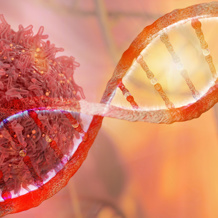Colon cancer (hereditary) / Lynch Syndrome
Colon cancer is diagnosed about 14,000 times a year (source: IKNL). Colon cancer is one of the most common types of cancer. About 5% of people diagnosed with this cancer type have a genetic disorder that increases the risk of cancer. This syndrome is very rare. The most common genetic disorder is the Lynch Syndrome, but familial adenomatous polyposis (FAP), MUTYH-associated polyposis (MAP), and other less common polyposis syndromes also increase your risk of developing colon cancer.
Read more about the Lynch syndrome on this page.
The Lynch Syndrome: the most common hereditary form of colon cancer
About 3% of all cases of colon cancer are caused by the Lynch Syndrome, making it the most common type of hereditary colon cancer. The Netherlands Cancer Institute currently treats or supervises about 200 patients with Lynch Syndrome. We diagnose about 20 patients with this syndrome every year at our Hereditary Cancer Clinic.
Lynch Syndrome: what is it?
People with Lynch Syndrome are most likely to develop colon or uterine cancer. These tumors develop at a relatively young age. Some people even develop multiple tumors, and most patients have one or more family members who have developed cancer.
The syndrome is named after American physician Henry T. Lynch who researched the inherited colon cancer syndrome back in 1966. It took until the 90s before researchers observed the gene mutations that cause the syndrome. Lynch syndrome is caused by a mutation in one of the following genes: MLH1, MSH2, MSH6, or PMS2. People who are genetically predisposed to develop the Lynch Syndrome have a higher risk of developing colon or uterine cancer. Not all people with Lynch Syndrome have the same risks. Next to colon cancer, people with Lynch Syndrome are at a higher risk of developing uterine, ovarian, stomach, small bowel, pancreatic, bile duct, renal pelvis, ureter, brain, and sebaceous cancer. Carriers of the PMS2 mutation have a lower risk of cancer than other Lynch patients.
The Lynch syndrome follows an autosomal dominant inheritance pattern. This means that both men and women can carry the genes and that all children from parents carrying the mutation have a 50% chance of inheriting the gene.
Characteristics and risk factors
People with Lynch Syndrome develop colon cancer at a much younger age than other people, who generally do not develop colon cancer until they are 70 years old. People with Lynch Syndrome often develop a tumor on the right side of the colon. The risk of developing another tumor within the first 10 years after colon surgery depends on the amount of bowel removed in the resection and the Lynch gene and ranges between 4% after extensive surgery, and 20% after milder surgery. The second most common cancer type in women with Lynch syndrome is uterine cancer. The risk of developing this type during a lifetime lies between 5 and 55% (depending on the gene mutation).
What can you do to prevent colon cancer?
The recommendations below have been researched extensively and can decrease your risk of developing colon cancer. No research has been done on patients with Lynch Syndrome, although the guidelines are still advised because they lead to a healthier lifenostyle.
- Eat plenty of fiber; whole-grain products, vegetables, fruit, and legumes;
- Avoid processed meats and don’t eat more than 500 grams of red meat like beef, lamb, or pork. Red meat does not mean unprepared meat;
- Keep a healthy weight and slim waistline. A healthy BMI lies between 18.5 and 24.9 kg/m2;
- Be physically active for at least 30 minutes a day;
- Avoid alcohol;
- Do not smoke.
Recognizing Lynch Syndrome
In order to find families with possible Lynch Syndrome, we will need to take a family medical history in which we trace all cancer types that occurred in children, brothers, sisters, and biological parents, uncles, aunts, and grandparents. This will help us track down people with Lynch Syndrome and their families. Early detection of carriers of gene mutations is important for early colon checks.
Adenomatous polyposis can grow into colon tumors. These polyps are more prone to develop into cancer for carriers of the gene mutations inherent to the Lynch Syndrome; often within two or three years. Polyps in people with regular colon cancer usually take at least seven to ten years to develop into cancer. We can detect cancer at an early stage through a colonoscopy, and all adenomatous polyposis can be detected and removed on time.
Signs of a genetic predisposition for cancer
- The same cancer type occurs too often in the family to be coincidental;
- Cancer develops at a young age;
- One person develops cancer twice, potentially even the same type;
- A certain combination of cancer types (like colon and uterine cancer) occurs in the family, either in one individual or among several people.
Diagnosis
Besides gynecological screenings, we will run the following tests:
 nl
nl
 Nederlands (Nederland)
Nederlands (Nederland)
 English (United States)
English (United States)

